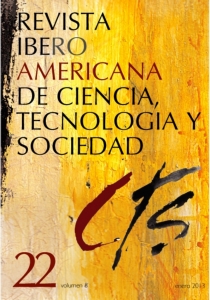Thomas Kuhn
science’s epistemologist or psychologist?
DOI:
https://doi.org/10.52712/issn.1850-0013-665Keywords:
scientific knowledge, psychology of knowledge, history of science, cognitive scienceAbstract
Kuhn’s interests led him from the history of science to epistemology and, passing through psychology, to different forms of understanding the historical phenomena of science. The data in our hands is an evidence of the fact that psychology of knowledge was always among such interests. This leads us to think about how these psychological theories can be related with their way to understand the historical development of science. By establishing different stages of Kuhn's thoughts, we can determine a parallelism between tthe different ways of producing the scientific knowledge that he considered in each stage and those psychological theories of knowledge that are clearly identifiable.
Downloads
References
BALTAS, A.; GAVROGLU, K. y KINDI, V. (2002b): “Una conversación con Thomas Kuhn”, en T. S. KUHN: “El camino desde la estructura”, Barcelona, Paidós.
CASTORINA, J. A. (2007): “El cambio conceptual en psicología: ¿cómo explicar la novedad cognoscitiva?”, Cultura y conocimientos sociales. Desafíos a la psicología del desarrollo, Buenos Aires, Aique.
CHALMERS, A. (2004): ¿Qué es esa cosa llamada ciencia?, Buenos Aires, Siglo XXI.
DESCARTES, R. (1965): Meditaciones Metafísicas, Buenos Aires, Schapire.
GAETA, R. y GENTILE, N. (1996): Thomas Kuhn: De los paradigmas a la Teoría Evolucionista. Buenos Aires, Oficina de Publicaciones del CBC, Universidad de Buenos Aires.
HANSON, N. R. (1977): Patterns of Discovery: An Inquiry into the Conceptual Foundations of Science, Cambridge, Cambridge University Press.
KÖHLER, W. (1999): The mentality of apes, Londres, Routledge.
KUHN, T. S. (1957/1985): “La revolución copernicana”, Madrid, Orbis.
KUHN, T. S. (1959/1996): “La tensión esencial: tradición e innovación en la investigación científica”, en T. S. Kuhn: La tensión esencial, México, FCE.
KUHN, T. S. (1962a/1996): “La estructura histórica del descubrimiento científico”, en T. S. Kuhn: La tensión esencial, México, FCE.
KUHN, T. S. (1962b/2002a): “La Estructura de las Revoluciones Científicas”, Buenos Aires, FCE.
KUHN, T. S. (1964/1996): “La función de los experimentos imaginarios”, en T. S. Kuhn: La tensión esencial, México, FCE.
KUHN, T. S. (1981/2002b): “¿Qué son las revoluciones científicas?”, en T. S. Kuhn: El camino desde la estructura, Barcelona, Paidós.
KUHN, T. S. (1989/2002b): “Mundos posibles en la historia de la ciencia”, en T. S. Kuhn: El camino desde la estructura, Barcelona, Paidós.
LORENZANO, C. (2002): “Los ancestros de Thomas Kuhn (Homenaje a Ludwik Fleck)”, Tercer Encuentro de Filosofía e Historia de la Ciencia del Cono Sur, Aguas de Lindoia,Brasil. Disponible en: http://www.clorenzano.com.ar/epistemologia/fleck.pdf
MAYORAL DE LUCAS, J. V. (2004): “Thomas S. Kuhn y el lenguaje científico, 1949- 1951: Los argumentos filosóficos de las Conferencias Lowell”, IV Congreso de la Sociedad de Lógica, Metodología y Filosofía de la Ciencia, Valladolid. Disponible en: http://www.solofici.org/images/stories/PDF/actas_iv_congreso_slmfce.pdf
NERSESSIAN, N. J. (2003): “Kuhn, conceptual change, and cognitive science”, en T. Nichols (ed.): Thomas Kuhn, Contemporary Philosophers in Focus, Cambridge University Press, pp. 178-211.
NUDLER, O. (2004): “Hacia un modelo de cambio conceptual: espacios controversiales y refocalización”, Revista de Filosofía, vol. 29, nº 2, pp. 7-19.
SKINNER, B. F. (1994): Sobre el conductismo, Buenos Aires, Editorial Planeta.
SOLÍS SANTOS, C. y SOTO RODRIGUEZ, P. (1998): “Thomas Kuhn y la ciencia cognitiva”, Alta tensión: filosofía, sociología e historia de la ciencia, Barcelona, Paidós.
ZAMORA BAÑO, F. (1994): “El último Kuhn”, Arbor,vol. 584, pp. 9-25.
Downloads
Published
How to Cite
Issue
Section
License
Copyright (c) 2024 CC Attribution 4.0

This work is licensed under a Creative Commons Attribution 4.0 International License.
All CTS's issues and academic articles are under a CC-BY license.
Since 2007, CTS has provided open and free access to all its contents, including the complete archive of its quarterly edition and the different products presented in its electronic platform. This decision is based on the belief that offering free access to published materials helps to build a greater and better exchange of knowledge.
In turn, for the quarterly edition, CTS allows institutional and thematic repositories, as well as personal web pages, to self-archive articles in their post-print or editorial version, immediately after the publication of the final version of each issue and under the condition that a link to the original source will be incorporated into the self-archive.











